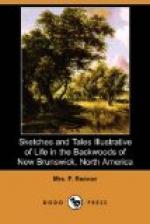The hot and sultry day was passed by Marion in a state of restless anxiety, but it was for Kenneth alone she feared, and the hours sped heavily till she might expect his return. Slowly the burning sun declined in the heavens, and poured a flood of golden radiance on the leafy trees and the bright waves of the majestic river, which rolled its graceful waters past the settlers dwelling. Marion left her infant asleep in a small shed at the back of the log-house, with Mary, her eldest daughter, to watch by it, and taking Charlie by the hand went out to the gate to look for her husband’s return. Kenneth’s father, an old and almost superannuated man, sat in the door-way, with twin girls of Kenneth’s sitting on his knees, singing their evening hymn, while he bent fondly over them.
Scarcely had Marion reached the wicket, when a loud yell—the wild war-whoop of the savage—rang on her startled ear. A thousand dark figures seemed to start from the water’s edge—the house was surrounded, and she beheld the grey hairs of the old man twined round in the hand of one, and the bright curls of her daughters gleamed in that of another; while the glittering tomahawk glared like lightning in her eyes. Madly she rushed forward to shield her children; the vengeance of the Indian was glutted, and the life-blood of their victims crimsoned the hearth stone! The house was soon in flames—the war dance was finished—and their canoes bounded lightly on the waters, bearing them far from the scene of their havoc.
As the sun set a heavy shower of rain fell and refreshed the parched earth—the flowers sent up a grateful fragrance on the evening air—the few singing birds of the woods poured forth their notes of melody—the blue jay screamed among the crimson buds of the maple, and the humming bird gleamed through the emerald sprays of the beech tree.




